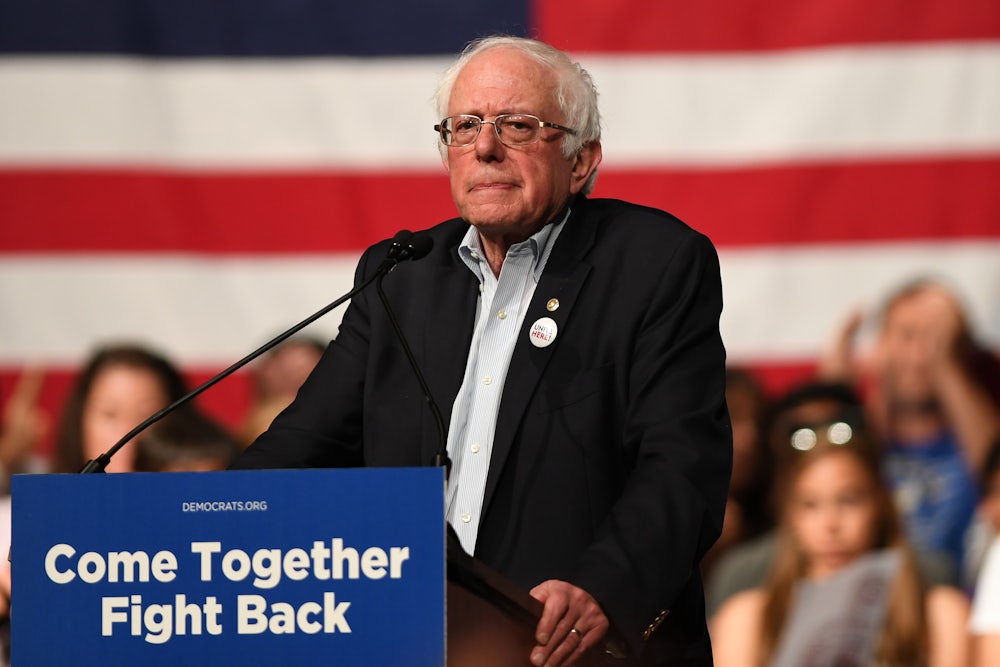Bernie Sanders will conclude his “Come Together and Fight Back” tour with Tom Perez this weekend—a political roadshow that’s taken the Vermont senator and the Democratic National Committee chair to more than half a dozen red and purple states across America since Monday. The goal of the tour, Sanders’s office said earlier this month, was “to begin the process of creating a Democratic Party which is strong and active in all 50 states, and a party which focuses on grassroots activism and the needs of working families.” But the tour was also meant to bridge divides between the Democratic establishment, as represented in last year’s primary by Hillary Clinton, and Sanders’s insurgent progressive wing.
In its push for Democrats to “come together,” the tour has been a decisive failure. Sanders supporters booed Perez in Portland, Maine, on Monday. On Tuesday, Sanders, a longtime independent and self-described democratic socialist, made headlines for reaffirming that he still doesn’t consider himself a Democrat. (His comments came in a joint interview with Perez that also exposed enduring messaging rifts between them.) The week got worse on Wednesday, when Sanders told The Washington Post that Georgia Democratic congressional candidate Jon Ossoff is “not a progressive,” and again on Thursday, when the tour mates were criticized for campaigning for Heath Mello, an anti-choice mayoral candidate in Omaha, Nebraska.
The negative press coverage of the tour is precisely what Democrats didn’t need after strong showings in special elections in Kansas and Georgia. “Sanders, Perez unity tour is off to a bumpy start,” CNN reported. “All week, two prominent figures on the left have been traveling the country on a Democratic Party unity tour, except there has not been too much unity,” said NPR. At a rally in Florida, NBC News concluded that “it was clear among Latino attendees there is still much work to be done in order to bring the Democratic party together before the next elections.” VICE News declared: “So much for unity: the Democrats are falling apart on the ‘come together’ tour.”
It’s no surprise that the Sanders-Perez tour hasn’t gone smoothly. The Democratic Party remains bitterly divided, and as the New Republic’s Brian Beutler argued on Thursday, “there is nothing obvious on the horizon that will prevent the basic Clinton-Sanders rift that sunk the party in 2016 from reemerging again and again.” A weeklong tour—even one that unites America’s most popular politician with the DNC chair he opposed—won’t magically resolve a fundamental disagreement about what the party should stand for.
But perhaps Sanders never expected as much. He’s made clear that he doesn’t care about Democratic unity so much as transforming the party in his progressive image. “I think the oddity here is to get your head around the fact that Democrats think he’s on their side,” said journalist Harry Jaffe, who wrote a biography of Sanders last year. Hilary Rosen, a Democratic strategist and longtime supporter of Hillary Clinton, told me that “Bernie Sanders thinks his brand is not to be a unifier.” “I don’t think he has much interest in encouraging everyone to get along,” she added. “I think he’s decided that his differentiator in the Democratic Party is to continue to be an outside critic.”
Josh Miller-Lewis, Bernie Sanders’s spokesman, has a more positive spin. When I suggested that the tour was ill-fated due to Democratic divisions, he told me, “I think it clearly wasn’t doomed to fail because it’s been a success in a lot of regards.” He touted “front-page stories at every stop we’ve been at,” adding, “I think the goal of the tour was to bring together two of the leaders of the resistance to Trump to unify both people who are already part of the Democratic Party and people who have felt left out by the Democratic Party around a strong progressive message.”
Symone Sanders, who was Sanders’s campaign press secretary (no relation), said her former boss does want to bring Democrats together, but acknowledged that his focus is to push progressive policies. “He told all y’all,” she said. “He’s not a Democrat. He’s an independent who cares about the issues.” Moreover, Sanders has no patience for the tightly scripted messaging that might have benefited a tour as delicate as this one. “Nobody puts baby in the corner,” she joked, “and nobody tells Bernie Sanders what to do.”
In retrospect, she said, “Maybe Bernie Sanders isn’t the guy for the unity tour.”
